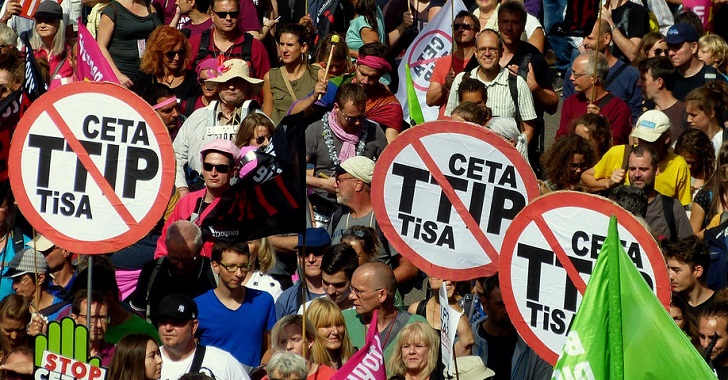(ANTIMEDIA) Over the weekend, thousands of protesters across multiple countries condemned impending trade deals promoted by governments and their corporate partners.
Though the protests received little coverage from mainstream media, they stretched from Paris to Warsaw.
The demonstrations came amid the Commission on International Trade of the European Parliament’s plans to finalize the Comprehensive Economic and Trade Agreement (CETA) this week. The policy has been likened to so-called “free trade” deals pushed by President Barack Obama and other Western governments.
CETA, which has been in the works for seven years, would eliminate tariffs between Canada and European nations, which proponents argue would foster increased trade and create jobs. Nevertheless, the deal has been criticized for granting too much power to multinational corporations, the Guardian reports.
Though the European Commission recently drafted a statement claiming “environmental and health standards will not be diluted,” not all policymakers are convinced.
Passage of CETA hit a roadblock after the parliament of the Wallonia region of Belgium rejected it. Wallonia’s minister-president, Paul Magnette, vowed to block the entire country from ratifying the deal. This has proponents of CETA concerned about the agreement’s future, as all 28 member states of the European Union must unanimously agree on it before it can be further negotiated and ratified.
As the Independent reported, opponents claim it will “set a dangerous precedent and be used as a template to push through the controversial EU-US trade deal, TTIP.”
TTIP is another loathed trade deal that has been in the works for years; it was also the target of protests over the weekend, as CETA has been heavily compared to it. TTIP is “a bi-lateral trade agreement [that is] about reducing the regulatory barriers to trade for big business, things like food safety law, environmental legislation, banking regulations and the sovereign powers of individual nations,” the Independent has explained.
TTIP is also expected to encroach on online privacy, increase unemployment rates, and undermine democracy by “allow[ing] companies to sue governments if those governments’ policies cause a loss of profits.”
France 24 reports police claimed 1,200 protesters assembled in Paris on Saturday to oppose to deal, though organizers of the event claim the figure was closer to 5,000. Protests also took place in Lyon and Toulouse.
“‘The European governments must today hear the refusal of their people,’ said Attac, an international movement seeking alternatives in the globalisation process, and one of the main organisers of the protest in Paris on Saturday,” France 24 reported.
Thousands also protested in Spain and Belgium, according to France 24. Telesur reported that protests also took place in Germany and other countries affected by the deals.
Further, hundreds of protesters in Warsaw, Poland, expressed concerns that passage of CETA would “allow an influx of food from North America that will destroy local farming, and also hurt consumers by allowing in foods that are genetically modified,” the Chicago Tribune reported. France 24 reported a higher number of demonstrators, noting 1,000 gathered in Warsaw while hundreds more demonstrated in Krakow.
Also on Saturday, activist lawyer group ClientEarth filed a lawsuit against the European Commission regarding the Investor-State Dispute Settlement (ISDS) and the Investment Court System — the specific TTIP components that would allow corporations to sue governments for lost profits.
The protests follow massive demonstrations in September that saw thousands march on E.U. headquarters in Brussels. The sentiment has not waned.
“We don’t want TTIP, CETA,” Warsaw protesters chanted over the weekend.” Human souls first and profits later.”



























Laissez un commentaire Votre adresse courriel ne sera pas publiée.
Veuillez vous connecter afin de laisser un commentaire.
Aucun commentaire trouvé